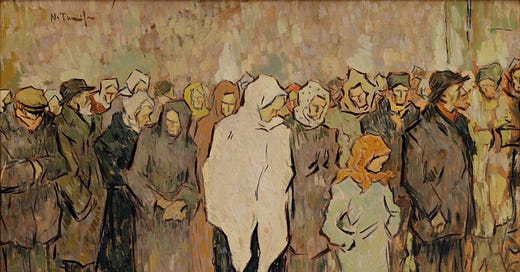Nicolae Tonitza, Bread Line
I’m sorry to have gone quiet on Substack recently. However, I have still been writing and would like to share an article and an essay which have just popped up online.
The article is Getting to the top of the mountain, with love in the Catholic Herald.
And the essay is Power and Poverty: Charles Dickens in the 21st Century in Humanum Review.
This essay is quite long, so here’s a preview so you can get a flavour before deciding whether to plunge in:
As a child, I walked the streets of Rochester barefoot, my shirt torn and my face covered in soot. If I had read them, which I hadn’t, I could have echoed the words of Pip at the beginning of Great Expectations: “Ours was the marsh country, down by the river, within, as the river wound, twenty miles of the sea.” However, unlike Pip, I didn’t know true poverty. When I paced the streets of Rochester without any shoes on, I was merely acting in the annual Dickens Festival. While the adults travelled down from London dressed as Mr. Pickwick or Betsey Trotwood, the children chose from a less extensive range of characters. Not knowing about Pip, I pretended to be Oliver Twist and looked forward to the day when I could be more warmly clad.
I was first exposed to the world of Charles Dickens not in the pages of a book but in the world around me. From the kitchen window of our house, we could peer across the River Medway to Chatham Dockyard, where Dickens’ improvident father worked as a clerk in the Naval Pay Office. Just up the road was Gad’s Hill Place, where Dickens wrote his final works in a magnificent Swiss writing chalet. The school bus took us as far as central Rochester where Pip was apprenticed, the Pickwick Club took refreshment, and Edwin Drood disappeared. Despite its magnificent Norman castle and cathedral, Rochester was still rather down at heel when I was young. The tourist boom, built on the back of Dickens’ popular and critical success, was yet to come.
I wasn’t that impressed when the local council began to cash in on the city’s Dickensian connections. To my youthful annoyance, the school bus was re-routed away from the high street, which was turned into a pedestrian zone complete with faux-Victorian lampposts. With hindsight, I realize that the revival was only ever partial. While local businesses rushed to rename themselves after characters from Dickens’ novels, pockets of poverty remained. Rochester High Street tailed off into empty shop fronts and derelict buildings. For every successful restaurant and ice cream parlour, there was another seedy shop desperately struggling to survive. Alongside such literary masterpieces as Jaggers Cocktail Bar and Sweet Expectations, there were several establishments with less portentous names: the Little Dorrit Tattoo Parlour chief among them.
And what’s coming next?
I’ve just had a great conversation with Bobby Mixa and Andrew Petiprin for their Spe Salvi Institute podcast. Watch this space!
I’m also thinking seriously about starting a podcast of my own. If anyone has any thoughts about what they would value in a podcast, please let me know.




